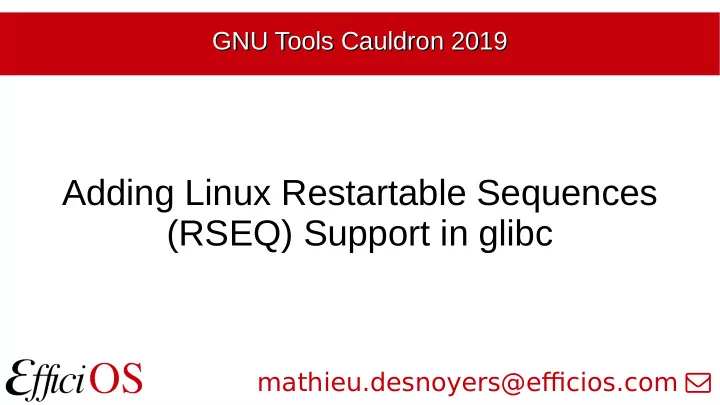

GNU Tools Cauldron 2019 GNU Tools Cauldron 2019 Adding Linux Restartable Sequences (RSEQ) Support in glibc mathieu.desnoyers@efcios.com
Content Content ● Restartable Sequences (RSEQ) Introduction ● Use-Cases ● Benchmarks ● Linux Integration ● glibc Integration ● Requirements ● Missing Pieces ● Open Issues ● Ongoing Work
What are Restartable Sequences (RSEQ) ? What are Restartable Sequences (RSEQ) ? ● Linux kernel system call registering a Thread-Local Storage area allowing user-space to perform updates on per-cpu data efficiently, ● Achieve critical section atomicity with respect to scheduler by aborting critical sections on preemption and signal delivery rather than disabling preemption. 3
RSEQ Structure Members RSEQ Structure Members Restartable Sequence Critical Section Abort Handler Thread-Local Storage __rseq_abi: struct rseq { int32_t cpu_id; struct rseq_cs *rseq_cs; struct rseq_cs { [...] void *start_ip; }; uint64_t post_commit_offset; void *abort_ip; [...] }; 4
RSEQ Use-Cases RSEQ Use-Cases ● Per-CPU pool memory allocation, ● Per-CPU ring buffer, ● Per-CPU statistics accounting, ● Per-CPU RCU grace period tracking, ● User-space PMU counters read from user-space on big/LITTLE ARM64, ● Spinlock improvements: – Preemption tracking, NUMA awareness. 5
RSEQ Benchmarks: Get Current CPU Number RSEQ Benchmarks: Get Current CPU Number 6
RSEQ Benchmarks: Statistics Counter RSEQ Benchmarks: Statistics Counter 7
RSEQ Benchmarks: LTTng-UST Ring Buffer RSEQ Benchmarks: LTTng-UST Ring Buffer 8
Restartable Sequences Linux Integration Restartable Sequences Linux Integration ● Linux 4.18: – RSEQ system call merged, – RSEQ wired up for x86 32/64, powerpc 32/64, arm 32, mips 32/64, ● Linux 4.19: – RSEQ wired up for arm 64, s390 32/64, 9
RSEQ Integration within glibc RSEQ Integration within glibc ● Registration/Unregistration of __rseq_abi TLS within glibc on C startup, and thread start/exit. ● Public header exposing RSEQ signature to users: – Uncommon 4-byte signature prior to abort handlers, – Security: prevents use of RSEQ as mechanism to redirect execution to arbitrary code, – Typically never executed, – Ideally traps if reached, valid instruction within objdump. 10
RSEQ Requirements RSEQ Requirements ● Use in application and libraries, ● Use in signal handler, – Nested on top of early/late thread lifetime, when RSEQ is not registered, ● Use in library constructors/destructors, – Dynamic linker needs to access TLS early for RSEQ registration before invoking library constructors, 11
RSEQ Requirements RSEQ Requirements ● Allow internal use within glibc: – sched_getcpu(3), – Memory allocator, – Locking, ● Smooth integration of RSEQ support within the user-space ecosystem: – Allow applications/libraries to use RSEQ with older glibc, – Without breaking upgrade to glibc supporting RSEQ. 12
Missing Pieces: GDB Support Missing Pieces: GDB Support ● If debugger/emulator single-steps within RSEQ critical section, it is always aborted, ● If abort triggers a retry: no progress. ● Proposed approach: – Skip RSEQ critical sections, – Similar to handling of LL/SC on various architectures, ● RSEQ headers emit information about all critical sections within __rseq_cs_ptr_array and __rseq_exit_point_array sections. 13
Missing Pieces: RSEQ glibc integration Missing Pieces: RSEQ glibc integration ● No concensus on __rseq_handled symbol, – Aims to allow applications/libraries to use RSEQ with old glibc, with smooth upgrade path. ● Could be removed from patch set if a few problems are solved in glibc. 14
Open Issues in glibc Open Issues in glibc ● Signals are enabled on thread startup: – RSEQ is not registered yet, – Disabling signals on thread startup/teardown would be an option. ● TLS cannot be touched by dynamic linker code: – Change glibc to allow TLS to be touched by dynamic linker before running library constructors. 15
Ongoing Work (Linux kernel) Ongoing Work (Linux kernel) ● Allow concurrent update of remote per-CPU data: – CPU-hotplug aware. ● Use-cases: – LTTng consumer daemon requiring to write into each per-CPU ring buffers periodically (flush timer), – Cleanup of free memory reserved for a CPU after it is unplugged. The CPU may be brought online again (concurrently). ● 16
Questions ? Questions ? ? 17
Recommend
More recommend